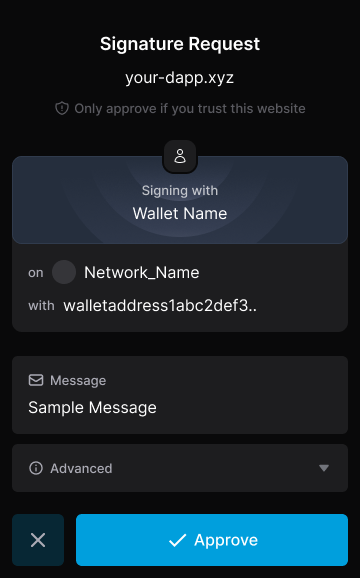Sign an Arbitrary Message
The signArbitrary and verifyArbitrary APIs enable off-chain proof of account ownership and message verification, adhering to the ADR-36 specification.
signArbitrary
Function Signatures
This method allows you to request an ADR-36-compliant signature, primarily used for off-chain account ownership proofs. The signature is generated based on the provided data.
signArbitrary(
chainId: string,
signer: string,
data: string | Uint8Array
): Promise<StdSignature>;
Parameters
| Parameter | Type | Description |
|---|---|---|
chainId | string | The chain ID of the chain for which the signature is being requested. |
signer | string | The Bech32 address of the account that will sign the message. |
data | string | Uint8Array | The arbitrary message to sign. If provided as a string, it will be displayed as plain text in the confirmation popup. |
Return Value
It returns a Promise<StdSignature> that resolves to the signature object.
StdSignature Interface
interface StdSignature {
readonly pub_key: PubKey;
readonly signature: string;
}
Example Usage
const chainId = "cosmoshub-4";
const signer = "cosmos1...";
const data = "This is a test message";
const signature = await keplr.signArbitrary(chainId, signer, data);
console.log("Generated Signature:", signature);
It displays the popup as follows:

ADR-36 Signing with signAmino
If you use the signAmino API with a sign doc formatted to meet ADR-36 requirements, it functions equivalently to signArbitrary. The required sign doc format is as follows:
-
Message Requirements:
- The message should be a single message of type
"sign/MsgSignData". - The message must include:
"signer": The account performing the signature."data": The message content, encoded in Base64.
- The message should be a single message of type
-
Sign Doc Fields:
chain_id: Must be an empty string ("").memo: Must be an empty string ("").account_number: Must be"0".sequence: Must be"0".fee: Must be{ gas: "0", amount: [] }.
Essential details about signAmino can be found in Amino Signing section in "Sign a Message" page.
Example Usage
const adr36SignData = async (chainId, signerAddress, message) => {
// Base64 encode the message as required by ADR-36
const base64Data = Buffer.from(message).toString("base64");
// Create a sign doc compliant with ADR-36
const signDoc = {
chain_id: "",
account_number: "0",
sequence: "0",
fee: { gas: "0", amount: [] },
memo: "",
msgs: [
{
type: "sign/MsgSignData",
value: {
signer: signerAddress,
data: base64Data,
},
},
],
};
const signResponse = await keplr.signAmino(chainId, signerAddress, signDoc);
console.log("Signed Document:", signResponse.signed);
console.log("Signature:", signResponse.signature);
return signResponse;
};
verifyArbitrary
Function Signatures
This method verifies the result of an ADR-36 signature generated via the signArbitrary or signAmino API.
verifyArbitrary is designed for simple usage and verifies the signature of the currently selected account only.
Recommendation: Use the verifyADR36Amino function from the @keplr-wallet/cosmos package or implement your own verification logic for more robust use cases.
verifyArbitrary(
chainId: string,
signer: string,
data: string | Uint8Array,
signature: StdSignature
): Promise<boolean>;
Parameters
| Parameter | Type | Description |
|---|---|---|
chainId | string | The chain ID of the chain for which the signature was created. |
signer | string | The Bech32 address of the account used to create the signature. |
data | string | Uint8Array | The original message that was signed. |
signature | StdSignature | The signature object to verify. |
Example Usage
const chainId = "cosmoshub-4";
const signer = "cosmos1...";
const data = "This is a test message";
const signature = {
pub_key: { type: "tendermint/PubKeySecp256k1", value: "..." },
signature: "...",
};
const isValid = await keplr.verifyArbitrary(chainId, signer, data, signature);
console.log("Is signature valid?", isValid);